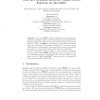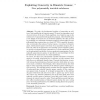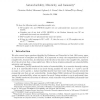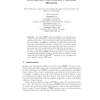MST
2010
13 years 7 months ago
2010
The class TFNP, defined by Megiddo and Papadimitriou, consists of multivalued functions with values that are polynomially verifiable and guaranteed to exist. Do we have evidence ...
SIAMCOMP
1998
13 years 9 months ago
1998
Polynomial-time safe and unsafe approximations for intractable sets were introduced by Meyer and Paterson [Technical Report TM-126, Laboratory for Computer Science, MIT, Cambridge,...
IPCO
1998
13 years 10 months ago
1998
We introduce a gain-scaling technique for the generalized maximum ow problem. Using this technique, we present three simple and intuitive polynomial-time combinatorialalgorithms fo...
APPROX
2010
Springer
13 years 11 months ago
2010
Springer
Abstract. We study the fundamental problem of computing an arbitrary Nash equilibrium in bimatrix games. We start by proposing a novel characterization of the set of Nash equilibri...
COCO
1994
Springer
14 years 1 months ago
1994
Springer
We show the following results regarding complete sets.
PLDI
2010
ACM
14 years 2 months ago
2010
ACM
Low-level program analysis is a fundamental problem, taking the shape of “flow analysis” in functional languages and “points-to” analysis in imperative and object-oriente...
TCC
2005
Springer
14 years 2 months ago
2005
Springer
The standard class of adversaries considered in cryptography is that of strict polynomial-time probabilistic machines. However, expected polynomial-time machines are often also co...
CSR
2007
Springer
14 years 3 months ago
2007
Springer
The class TFNP, defined by Megiddo and Papadimitriou, consists of multivalued functions with values that are polynomially verifiable and guaranteed to exist. Do we have evidence ...




